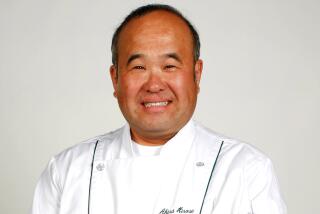French chef Roger Vergé, a leader of the nouvelle cuisine movement, dies at 85
- Share via
Roger Vergé, one of the first superstar chefs whose light, fresh and artfully plated food turned his restaurant near Cannes, France, into a landmark of French gastronomy and a beacon of nouvelle cuisine, has died. He was 85.
Vergé, whose Le Moulin de Mougins earned three Michelin stars within five years of its 1969 opening, died June 5 in Mougins, according to the Associated Press. The cause was not given.
With his thick mustache and matinee idol charm, Vergé was, as the influential restaurant guide Gault-Millau described him, “the very incarnation of the great French chef for foreigners.”
Along with Paul Bocuse, Michel Guerard and the Troisgrois brothers, Vergé freed French cuisine from the rules that had defined it for a hundred years, abandoning heavy sauces, strong marinades and long cooking times for a simpler approach that emphasized the natural flavors of food.
Strongly influenced by the herbs, spices and sun-ripened vegetables of Provence and his extensive travels in Africa and Jamaica, he called his approach “Cuisine of the Sun,” which was also the name of his first cookbook.
His culinary style, he wrote, was “the antithesis of cooking to impress — rich and pretentious. It is a lighthearted, healthy and natural way of cooking which combines the products of the earth like a bouquet of wild flowers from the garden.”
His kitchen was a training ground for a number of celebrated chefs who later brought their talents to this country, among them David Bouley, Hubert Keller, Alain Ducasse and Daniel Boulud.
“What did I learn with Vergé? Better to ask, What didn’t I learn? Every one of my cooking skills was honed,” the New York-based Boulud wrote in his memoir, “Letters to a Young Chef.”
Vergé brought his ideas to America in the mid-1970s when he and other leading practitioners of the new French gastronomy gave classes in Napa Valley as California cuisine was evolving along similar lines. Later, with his friends Bocuse and Gaston Lenotre, he operated restaurants in the French Pavilion at Disney World in Orlando, Fla.
Le Moulin de Mougins, however, remained the touchstone. Located in a converted 16th century olive oil mill across the road from one of Pablo Picasso’s homes, it quickly became a pilgrimage spot for gourmands and a favorite of celebrities visiting the annual Cannes Film Festival. It earned three Michelin stars in rapid succession, in 1970, 1972 and 1974.
In 1977, with his wife, Denise, he opened a second restaurant, L’Amandier de Mougins, and a cooking school.
The son of a blacksmith, Vergé was born on April 7, 1930, in Commentry, a village in central France. He was one of nine children in a family that loved food.
“One of my grandfathers would wake up at 4 a.m., drink a cup of black coffee, and eat a whole roast chicken,” he once told Julia Child who recounted her conversation with the chef in “My Life in France,” her 2006 autobiography. “Then he’d drink a second cup of coffee and eat a second chicken. Mind you, this was before breakfast, just to start the day right … and every day, too!”
Vergé’s first and most influential teachers in the kitchen were his mother and especially his aunt, who spent the whole day Sunday preparing food. His book “Roger Verge’s Vegetables in the French Style” (1994), is an homage to the two women, whose fricassee of spring vegetables, he wrote, “represents all the happiness that life can afford.”
At 17 Vergé was apprenticed to a local chef, then continued his culinary education at two of Paris’ temples of haute cuisine, La Tour D’Argent and Plaza Athenee. Eager to explore other cuisines, he spent more than a decade cooking his way through the Caribbean and Africa.
When he returned to France, he fused the flavors of the countries he visited with those of his own. Boulud recalled making Vergé’s lamb shoulder with Provencal herbs and Middle Eastern accents of star anise, cinnamon and orange peel. His travels abroad also inspired him to use fresh fruits in savory dishes, such as his appetizer of hot oysters with orange pieces and orange butter.
Still, Vergé “could not have come from anywhere but France,” wrote Child, who became a close friend. He was “a quintessential example of what a true chef should be ... the kind of dedicated cuisinier that had so inspired my love of France and its food.”
He offended American chefs in 1985 when, at a benefit in New York, he said new American cooking “looks Japanese: large dishes, small portions, no taste, but very expensive.”
He later explained that his remarks were aimed at the excesses of nouvelle cuisine on both sides of the Atlantic.
“Everywhere, people just want to make something new,” he said in Nation’s Restaurant News. “But some places just don’t do it correctly.”
Vergé, who ran Le Moulin for three decades, retired in 2003. His survivors include his wife, three daughters and three grandchildren.
Twitter: @ewooLATimes
More to Read
Start your day right
Sign up for Essential California for the L.A. Times biggest news, features and recommendations in your inbox six days a week.
You may occasionally receive promotional content from the Los Angeles Times.







